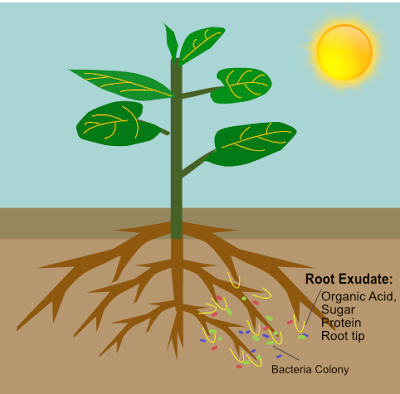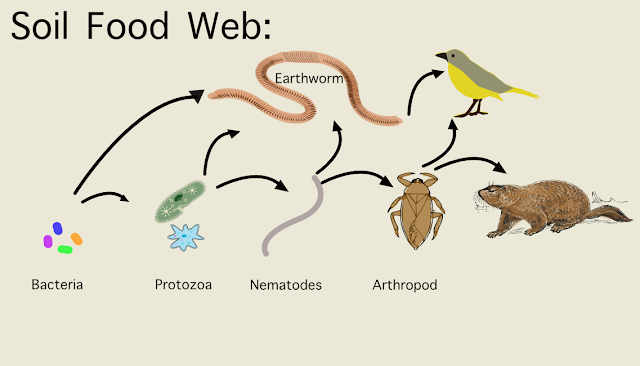Do you know that a teaspoon of healthy garden soil contains billions invisible bacteria, several yards of fungal hyphae, thousands of protozoa and dozen nematodes?
Animals that live in the soil are the key to make healthy soil. They form soil food webs. In the bottom of the soil food web, it's bacteria. They produce "slime" to stick soil particles together, they provide food to others and they hold nitrogen in their body.
In the area of plant root (rhizosphere), plant roots exudate their waste, including root caps, sugar, protein, organic acid, attracting and providing food to a community of bacteria and fungi.
 |
| Plant roots attract bacteria because root exudate contains sugar and root tips |
Bacteria produce bio-slime which sticks soil particles together
Bacteria are so tiny that they need to stick to things, or they will get washed away. To attached themselves to the soil particles, they produce a "slime" which accidentally bounds soil particles together. If it sounds strange to you, just think about the plaque produced overnight in your mouth, which enables mouth bacteria to stick to your teeth surface.
Bacteria provide food to worms and larvae who create pores in the soil
Nematode and protozoa feed on bacteria. Later, worms and insect larvae feed on nematode, protozoa or even bacteria. These animals with different body width move through the soil in search of food , creating pathways that allow air and water to enter and leave the soil. If the soil doesn't have bacteria, usually when you put commercial fertilizer and pesticide, there will be no other creatures in the soil.
 |
| Soil Food Web |
Bacteria and soil critters keep nitrogen in their body
Bacteria retains the nitrogen in their body cell, when they are eaten by other animals, for example, roundworms or protozoa, the nitrogen will be released back to the soil as digestive waste. Because their life cycles are short, there are always critters and bacteria dying and born on a balanced rate. Thus, soil life immobilizes and regularly releases the nitrogen in the soil, without them the nitrogen will get washed away, just like the commercial fertilizer you bought and apply to the poor soil.
When these organisms die, most of the nitrogen is released as waste in the form of plant-available ammonium(NH4+). It's called "Mineralization". Depending on the soil environment, this can either remain as ammonium of be converted into nitrate (NO3-) by special bacteria.
Why we never fertilize old growth forest? Because bacteria is the source of nitrogen. If you use commercial fertilizer, herbicide or pesticide, you will change the pH of the soil and kill the bacteria. Once the soil lose bacteria, it will lose water holding capacity and nitrogen, and then you will need to keep buying the commercial fertilizer and water more. You will keep fertilizing, keep watering, and keep leaching out the nitrogen, too.





0 Comments